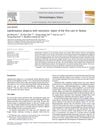 5 citations,
October 2020 in “Lasers in Medical Science”
5 citations,
October 2020 in “Lasers in Medical Science” Combination therapy works best for female hair loss, increasing density and thickness.
 73 citations,
May 1976 in “JAMA”
73 citations,
May 1976 in “JAMA” Long-term parenteral nutrition without zinc can cause severe zinc deficiency.
 30 citations,
August 2010 in “American Journal of Clinical Dermatology”
30 citations,
August 2010 in “American Journal of Clinical Dermatology” Cetuximab can cause eyelash growth, which is rare but manageable.
 1 citations,
January 2019 in “Turk Dermatoloji Dergisi”
1 citations,
January 2019 in “Turk Dermatoloji Dergisi” Oxidative stress is likely important in causing telogen effluvium, and antioxidants might help treat it.
 3 citations,
April 2022 in “Clinical, Cosmetic and Investigational Dermatology”
3 citations,
April 2022 in “Clinical, Cosmetic and Investigational Dermatology” Different methods, including stress management, healthy diet, supplements, and treatments like minoxidil, can help hair grow back after COVID-19 related hair loss.
 6 citations,
January 2018 in “PubMed”
6 citations,
January 2018 in “PubMed” Heavy metals might contribute to hair loss in Telogen Effluvium.
1 citations,
November 2020 in “Cureus” Clinical signs of hyperandrogenism are related to female pattern hair loss severity, but biochemical markers are not.
October 2023 in “Journal of Gandhara medical and dental sciences” Quarantine increased hair fall, especially in young women, with no direct link to short sun exposure.
 January 2020 in “Turkiye Klinikleri Journal of Dermatology”
January 2020 in “Turkiye Klinikleri Journal of Dermatology” People with chronic hair shedding had much lower vitamin D levels compared to healthy people.
January 2021 in “Menoufia Medical Journal” Women with pattern hair loss often have higher blood sugar, cholesterol, blood pressure, and waist size, suggesting a link between hair loss and metabolic syndrome.
June 2024 in “jurnal ABDIMAS Indonesia” Vitamin D education and supplementation improve hair health in the elderly.
 May 2024 in “World Journal Of Advanced Research and Reviews”
May 2024 in “World Journal Of Advanced Research and Reviews” Low iron levels are strongly linked to chronic hair loss in women.
 2 citations,
January 2019 in “Case Reports in Dermatology”
2 citations,
January 2019 in “Case Reports in Dermatology” A 66-year-old woman's thick scalp and hair loss were confirmed as lipedematous alopecia, a rare condition possibly influenced by genetics, with no effective treatment known.
 2 citations,
March 2011 in “Dermatologica Sinica”
2 citations,
March 2011 in “Dermatologica Sinica” Taiwan reported its first case of a rare scalp condition with no clear cause or treatment.

No treatment alters the natural progression of alopecia areata, and effectiveness varies, with some possibly working better in children.
 51 citations,
September 2015 in “Medical Clinics of North America”
51 citations,
September 2015 in “Medical Clinics of North America” The conclusion is that acne, alopecia, and hyperhidrosis are common skin issues with various treatments available, and accurate diagnosis is key for effective management.
 July 2018 in “Elsevier eBooks”
July 2018 in “Elsevier eBooks” The most common cause of hair loss in children is tinea capitis, followed by alopecia areata and telogen effluvium.
 April 2017 in “InTech eBooks”
April 2017 in “InTech eBooks” Many people with hair loss experience scalp pain known as trichodynia, but the causes are unclear and treatments vary.

Topical minoxidil helps treat hair loss in teens, but more research needed for safe options.
 August 2018 in “Journal of the American Academy of Dermatology”
August 2018 in “Journal of the American Academy of Dermatology” Calcipotriol may effectively treat hair loss in alopecia areata, working better in children than adults.
 12 citations,
February 2001 in “Annals of Pharmacotherapy”
12 citations,
February 2001 in “Annals of Pharmacotherapy” No effective treatment for hair loss after childbirth was found, but it usually gets better on its own and some cosmetic methods might help.
 3 citations,
December 2020 in “Journal of the turkish academy of dermatology”
3 citations,
December 2020 in “Journal of the turkish academy of dermatology” Stromal Vascular Fraction treatment increases hair density and thickness, making it a safe and effective treatment for Androgenetic Alopecia.
 1 citations,
March 2014 in “Turkderm”
1 citations,
March 2014 in “Turkderm” Trichoscopy helps tell different hair loss types apart using specific scalp and hair patterns.
 22 citations,
January 2018 in “Experimental Dermatology”
22 citations,
January 2018 in “Experimental Dermatology” The meeting focused on understanding, diagnosing, and finding treatments for irreversible hair loss diseases.
 February 2014 in “Medicine - Programa De Formación Médica Continuada Acreditado”
February 2014 in “Medicine - Programa De Formación Médica Continuada Acreditado” The document concludes that non-scarring alopecias can be reversed, but scarring alopecias cause permanent hair loss.
 5 citations,
February 2013 in “Dermatology and therapy”
5 citations,
February 2013 in “Dermatology and therapy” Crescina® lotion helps reduce hair loss and increase hair growth in males with androgenetic alopecia.
 38 citations,
September 1996 in “Annals of Clinical Psychiatry”
38 citations,
September 1996 in “Annals of Clinical Psychiatry” Hair loss from mood stabilizers is common but can be managed without stopping the medication.

Hair loss in women with PCOS is linked to high androgen levels but the relationship is unclear.
 January 2020 in “Archives of Medicine and Health Sciences”
January 2020 in “Archives of Medicine and Health Sciences” Certain immune molecules and stress affect hair loss, and while genes play a role, more research is needed to fully understand and treat it.
 November 2019 in “Harper's Textbook of Pediatric Dermatology”
November 2019 in “Harper's Textbook of Pediatric Dermatology” Understanding normal hair growth and loss in children is key to diagnosing and treating hair disorders.


























